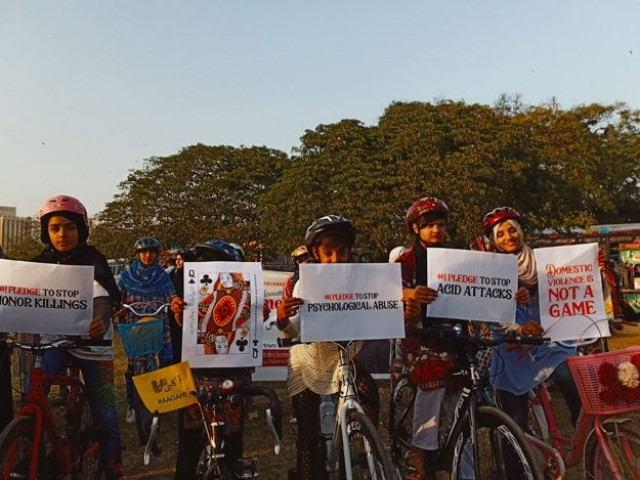LHC seeks replies on 'regulating' Aurat March
Petitioner says he doesn't want to stop Aurat March but warns against crossing limits by criticising, abusing men

Participants holding placards at the Aurat March in Karachi. PHOTO: EXPRESS
LHC Chief Justice Mamoon Rashid Sheikh heard the petition against Aurat March, requesting the court to restrain active social media advertisement of "such anti-state activities".
The petitioner also asked the bench to promulgate Punjab Red Zone (Establishment and Security) Act 2018 to regulate protests such as Aurat March.
Artist Shehzil Malik calls for Aurat March poster design submissions
During the hearing, Jilani contended that the Aurat March was observed peacefully to highlight the importance of women in society. She questioned why the petitioner wanted to curtail the event's advertisements on social media.
Jilani lamented that the petition had been admitted without hearing objections over its maintainability. To which the LHC top judge observed that the plea had not been admitted yet.
Petitioner's counsel Azhar Siddique said his client did not intend to stop the Aurat March but had reservations over the "immoral" content on posters and placards carried by the women.
Jilani also pointed out that the petition in fact sought to prevent Aurat March. The petitioner's counsel argued that there should be "limitations" to the march.
Justice Mamoon asked how can the bench impose sanctions when the law guarantees freedom of expression. "As far as the business community's concerns, the Aurat March is on a public holiday," he observed.
The LHC top judge asserted that every citizen had the right to freedom of expression and directed the DIG operations to apprise the court regarding the security situation.
Jilani recalled that some segments of the society had tried mudslinging the march but police's official report revealed that the event was carried out peacefully.
She further informed the bench that the organisers were on board with the administration hence the petition was unnecessary. The counsel said the sanctions on Aurat March's posts on social media were baffling.
Petitioner maintained that the Aurat March coincided with the International Women's Day i.e. March 8 when women intended to participate in rallies with posters and placards displaying messages that manifest "anarchy and vulgarity".
He said women's day itself should be to recognise and appreciate women for their achievements and show solidarity with those battling cruelty, discrimination and violence but warned them against crossing limits by criticising and abusing men.
Petitioner said the rally had garnered backlash last year over "offensive" messages. He said on prima facie the march is a miss-direction and a failed attempt to raise grave issues commonly faced by women that include “education of women, career building, equal pay, a safer environment free from sexual molestation and harassment”.
Social media rules: Senate’s IT panel miffed at being kept in dark
The petitioner claimed that the Pashtun Tahaffuz Movement (PTM) and its allies had a "hidden agenda" and were major stakeholders in the march.
He argued that "various anti-state parties" were funding the march for the sole purpose of spreading anarchy. "Their hidden agenda includes spreading anarchy, vulgarity and hatred" against religious norms.
He has requested the court to direct the Pakistan Telecommunication Authority (PTA) and the federal government to place Citizens Protection (Against Online Harm) Rules 2020 under the Pakistan Telecommunication (Re-Organization) Act, 1996 and Prevention of Electronic Crimes Act 2016 and also establish a mechanism for effective implementation of the laws to regulate social media as soon as possible so "anti-state activities" such as Aurat March are not advertised.



















COMMENTS
Comments are moderated and generally will be posted if they are on-topic and not abusive.
For more information, please see our Comments FAQ